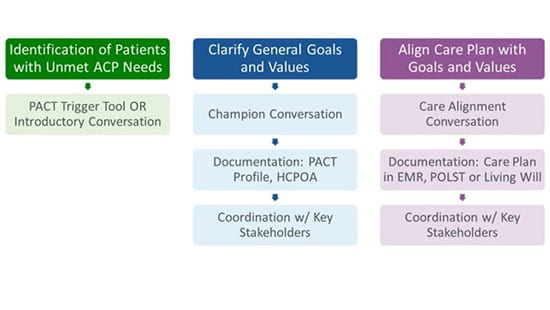PACT partners with institutions to implement advance care planning solutions for seriously ill patients. We emphasize that Advance Care Planning is not a one-time task that falls to one person, but rather a team-based process of clarifying patient care goals throughout the course of illness and of matching care plans to the patient’s wishes. Developed by a nationally recognized team of clinicians and educators, the PACT program offers a suite of solutions to help facilitate the process.
PACT Toolkit
PACT supplies a robust toolkit to accompany every step of the PACT process.
- Process Map. This is a visual representation of the PACT process.
- Trigger Tool and Manual. The PACT Trigger Tool is used to screen for patients with unmet advance care planning needs who are most in need of a Goals of Care conversation.
- PACT Profile. The PACT profile is used to document a patient’s hopes and wishes in the face of a serious illness and to align care with the patient’s wishes.
- Conversations Guides. The conversation guides act as reminders of key points when talking to patients and their loved ones about goals and wishes.
Intensive Skills Training
- Online training videos, exercises, and presentations describe every step of the PACT process.
- In-person communication skills training workshops with simulated patients help in mastering the skills necessary to have difficult conversations with people facing a serious illness.


Mentored Implementation
- Each site is assigned a mentor experienced in the clinical aspects of advance care planning as well as in quality improvement. Our mentored implementation process includes personalized webinars, regular conference calls, and in-person site visits, all aimed at helping sites to effectively adapt the PACT process at partnering institution and to navigate challenging situations.
- We collect, analyze, and report back on key PACT metrics to better measure outcomes and address areas for improvement.
- Each site’s assigned mentor helps the site form a team, garner support from stakeholders, implement the PACT process, analyze data and use rapid-cycle quality improvement to ensure success.

